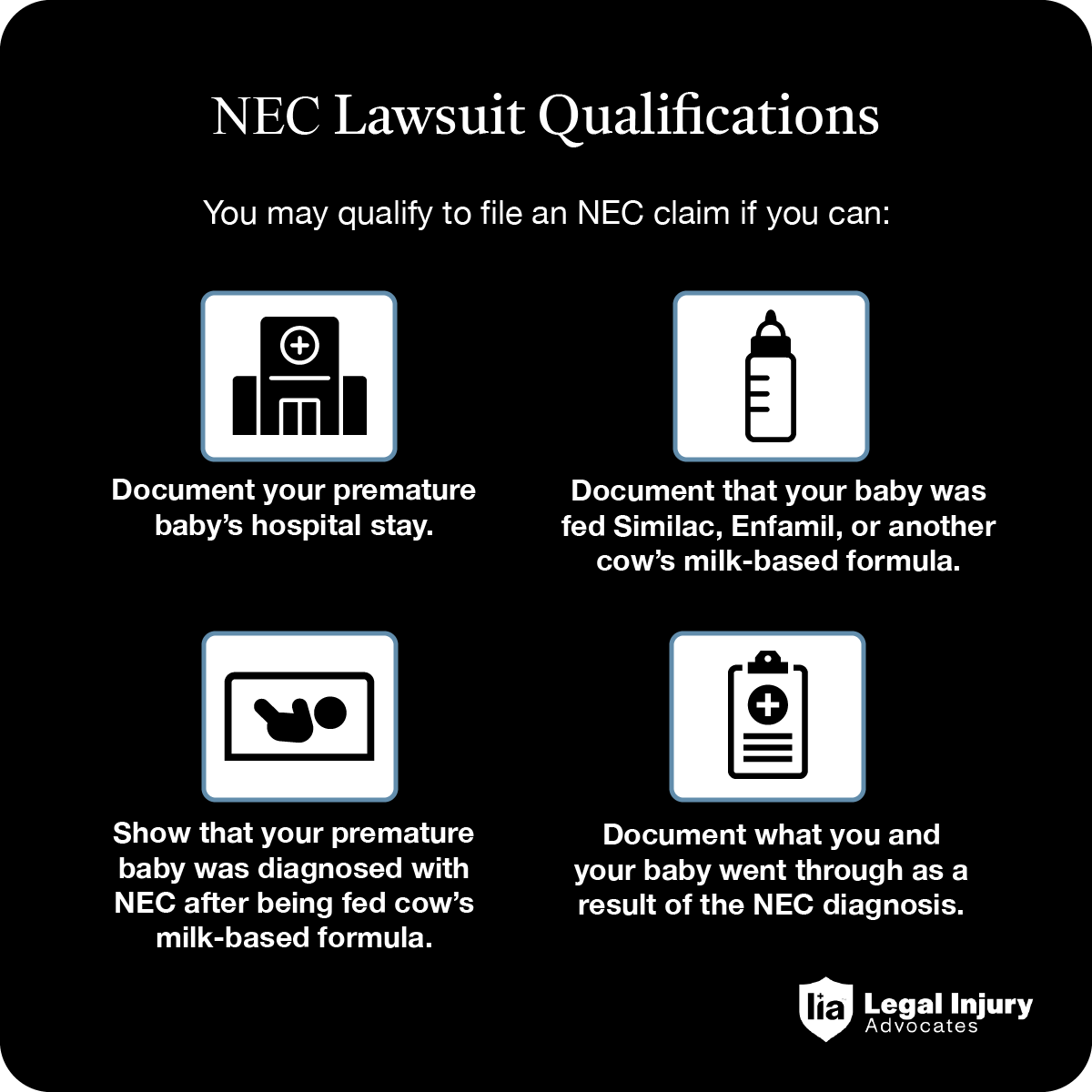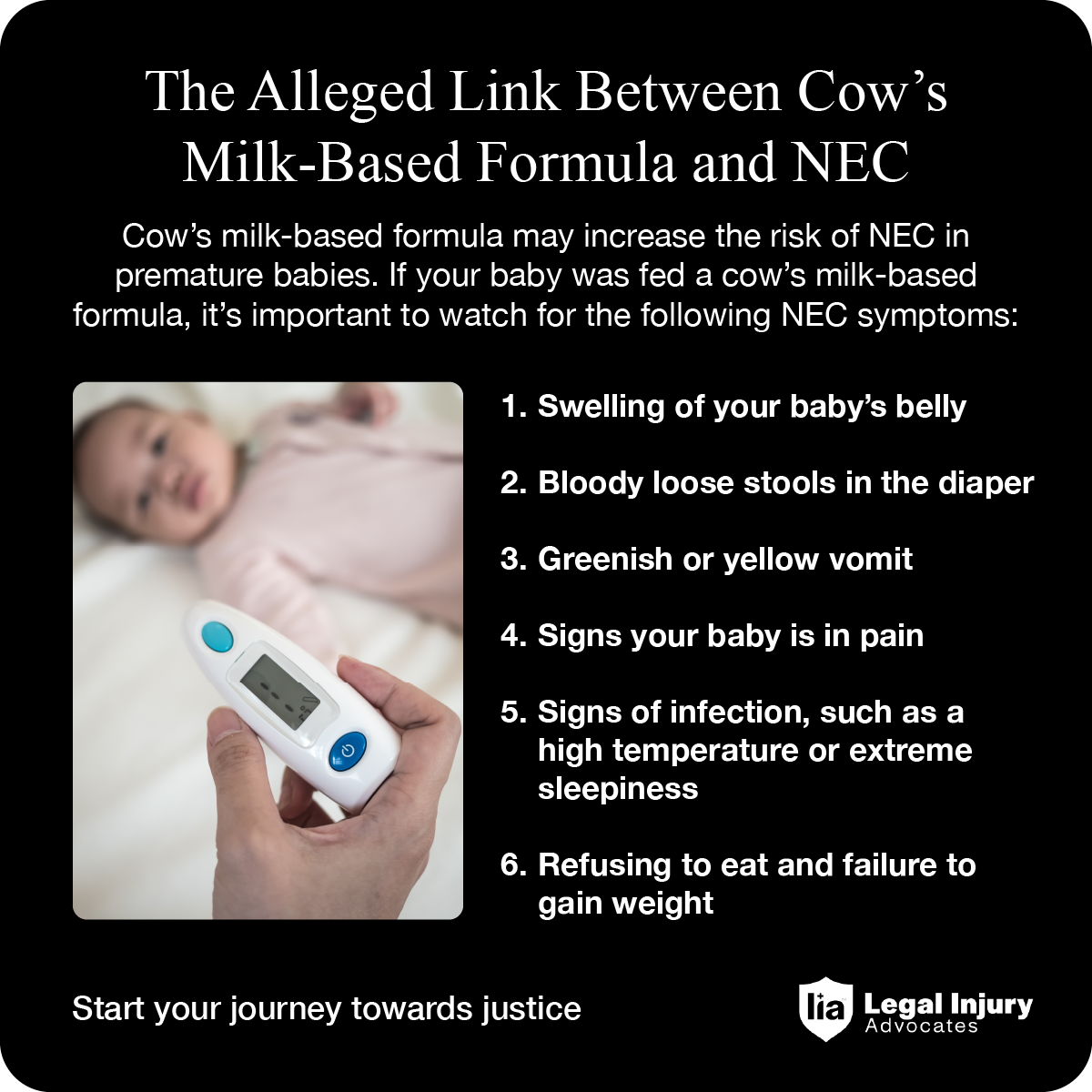Seek justice for you or your loved ones
Who may qualify for an NEC lawsuit?

It is important first to know if your baby’s suffering meets NEC lawsuit qualifications. Qualifications include, but may not be limited to,:
- Documenting your premature baby’s hospital stay since babies born prematurely or with a low birth weight are allegedly most likely to suffer NEC complications due to being fed these formulas.
- Documenting that your baby was fed Similac, Enfamil, or another related cow’s milk-based brand.
- Showing that your premature baby was diagnosed with NEC after being fed a cow’s milk-based formula.
- Documenting what you and your baby went through as a result of the NEC diagnosis.
A NEC lawyer can help you establish a link between your baby being fed these formulas and then suffering from NEC.

How to start your NEC claim:
-
1
Fill out the form or call us at (855) LIA-5555.
Start your NEC claim by completing our online form or giving us a call to share basic details about your claim. -
2
Share your story with our team.
Our team will listen to your story about how you and your baby suffered from NEC, answer questions and assess whether your claim may qualify for legal action. -
3
Let our legal team review your claim.
An NEC attorney or another member of the legal team will review your claim and discuss next steps. -
4
Prepare for your case.
You may need to submit medical records or important documents to help the legal team evaluate the extent of harm caused to your baby possibly from these infant formulas. We’ll discuss this with you. -
5
Start your journey to justice.
If your NEC claim qualifies, our legal team will guide you through the legal process to seek compensation and accountability.
Check If You Qualify
Submit your claim here:

The alleged link between cow’s milk-based baby formula and NEC

Necrotizing enterocolitis (NEC) is when something causes your baby’s delicate intestines to become inflamed and often infected. The cells of your baby’s intestines die or are damaged, which can cause a hole, leading to stomach acids, partially digested food, and bacteria leaking into their abdomen.
As you can imagine, the inflammation itself can be extremely painful to your newborn, and if they suffer a hole in their intestine, the pain can be intense. The danger of more damage to their organs or a whole-body infection is very real and is potentially life-threatening. In addition, lifelong problems may occur.
The statistics are tragic. Up to 50.9% of extremely low birth weight infants die from NEC if they require surgery. For those that survive the surgery, neurodevelopmental disorders, eventual intestinal failure, and other serious complications occur in up to 59.3% of cases.
Studies have linked NEC to feeding premature and low-birth-weight babies formulas based on cow’s milk.
Does cow's milk-based formula increase the risk of NEC?
Studies have shown a link between baby formulas made with cow’s milk and NEC. One study found that premature babies fed exclusively cow’s milk-based formula were 6-10 times more likely to develop NEC than babies fed breast milk alone.
NEC risk factors and warning signs
The alleged risk factors for NEC include being born prematurely, low birth weight, and being fed cow’s milk-based baby formula. Some NEC symptoms to look out for include, but may not be limited to:
- Swelling of your baby’s belly
- Bloody loose stools in the diaper
- Greenish or yellow vomit
- Signs your baby is in pain
- Signs of infection that can include a high temperature, extreme sleepiness, changes in the heart rate, and struggles to breathe
- Refusing to eat and failure to gain weight
Companies involved in the NEC lawsuits

Few companies make baby formula in the highly regulated U.S. market. Two of them make cow’s milk-based formula linked to NEC:
- Abbott Laboratories: This company makes the Similac brand of cow’s milk–based baby formula that has been linked to NEC.
- Mead Johnson & Company: This company, acquired by Reckitt Benckiser in 2017, makes and markets Enfamil cow’s milk-based baby formula linked to NEC.

Important NEC lawsuit updates
If you think you may have a baby formula case, you should stay current on developments in the court that could affect your ability to get justice and compensation.
- Exactly how many pending lawsuits are unknown, as new ones are being filed all the time. Most have been gathered into a single court to simplify the judicial process. This practice of putting similar cases in one court is called a multidistrict litigation, or MDL. The Northern District of Illinois is where most baby formula lawsuits are being heard.
- Some cases have already seen verdicts at trial, including a state court case against Abbott Laboratories where a jury awarded $495 million in damages in one of numerous lawsuits about NEC risks. Another case against Mead Johnson had a $60 million verdict.
- The link between cow’s milk-based formulas Enfamil and Similac and NEC was first made in 1990 with the study published in Lancet.
-
January 2025: Bellwether cases scheduled
The first cases in the baby formula MDL have been scheduled. MDLs choose cases that are similar to many other lawsuits in the MDL and that bring up important issues that need to be resolved. It gives the court and both sides in all of the lawsuits an idea of how a jury might see evidence and arguments and how they might make a decision. Based on the outcomes of the bellwether cases, parties may choose to settle, drop the case, or be even more aggressive in going to trial. The first MDL NEC baby formula lawsuit is set to begin in May 2025.
-
July 2024: Abbott loses trial
Abbott lost a case and was ordered to pay $495 million to the family of a premature baby girl.
-
March 2024: Mead Johnson loses trial
Mead was ordered to pay $60 million for a baby who died because of NEC linked to cow’s milk-based baby formula.
-
August 2022: MDL set up
Some 97 lawsuits were brought together under a single judge to create the NEC MDL. Now the number is in the hundreds.
Reasons to work with an NEC lawyer
It takes a NEC lawyer to understand complexities in cases like these lawsuits, especially the ins and outs of the MDL. Legal Injury Advocates, along with our experienced co-counsel, will guide you through each step of the NEC lawsuit process, from gathering medical records and any other relevant documentation to filing your claim and seeking compensation for damages if you qualify. We are committed to helping you get the justice and compensation you may deserve.

Why NEC victims trust Legal Injury Advocates

Free Initial Claim Review
We’ll review your claim for free—no upfront costs, no risk.
Clear, Honest Communication
We, along with our co-counsel, will keep you informed every step of the way with straightforward, honest updates.
Legal Help Anywhere in the U.S.
Our team is ready to fight for you no matter where you live, if you qualify.
No Fee Unless You Win
You don’t pay anything unless we win your case—no risk, no obligation.
Initial Eligibility Check
Call us at (855) LIA-5555 or fill out the form to see if you qualify.
Proven Results
Our experienced legal team and co-counsel have spent decades winning cases like yours.
You may have a strong NEC claim, but time may be limited to file. Contact us to see if you qualify:
FAQs
-
Why are families filing lawsuits against the makers of Enfamil and Similar?
If your baby is diagnosed with NEC, you are aware of how harrowing it can be for your baby and you. Premature babies fed baby formulas made from cow’s milk have been shown to be more likely to suffer this condition.
People are filing lawsuits against Abbott Laboratories and Mead Johnson, the makers of these formula brands. They accuse them of failing to warn parents and doctors of the risks. The lawsuits claim these companies either knew or should have known about the dangers their products posed to premature babies. The lawsuits allege that rather than care about your baby, these companies cared more about money and continued to push these products as safe.
With key lawsuits scheduled, it is important to submit a claim and start a NEC lawsuit. The law does put time limits on your ability to sue. Start by talking to an NEC lawyer with experience and knowledge to see if your situation meets NEC lawsuit qualifications.
-
What brands and products are included in the baby formula lawsuits?
Two companies and their cow’s milk-based baby formula brands are used extensively in NICUs. Abbott with Similac and Mead Johnson with Enfamil are the companies and brands linked to NEC in premature babies. -
Is there an NEC class action lawsuit?
There is no NEC class action lawsuit. Instead, cases from all over the country are being heard by the same court in a multidistrict litigation or MDL. The MDL for NEC lawsuits is in Illinois. An MDL may be a better choice because you can make individual decisions about your case. Being in an MDL can lead to faster resolutions as each case starts with a judge who already knows the issues and the evidence. While any lawsuit is unpredictable, being in an MDL allows your lawyer to compare your case with others and give you sound advice on your chances and on what might be a good settlement. Having said this, successful NEC cases are taking place in state court, which is outside the federal MDL system.
-
How long do I have to file an NEC baby formula lawsuit?
How long you have to file a baby formula lawsuit depends on your state and whether you are filing as a parent or you are filing on behalf of a child. The child has a longer statute of limitations. Whatever the timeframe is in your state, it is best to file as soon as you can. Your legal team can walk you through your specific statute of limitation. -
Has anyone received money from an NEC lawsuit?
A jury awarded one family a $495 million judgment against Abbott Laboratories, and another family was awarded $60 million from Mead Johnson. In both cases, the court found that the companies did not warn families about the risk of NEC.The defendants are appealing both cases.
-
Have any formulas been recalled due to NEC risks?
While both brands have gone through recalls for other issues, none have been recalled due to NEC risk. Both brands are still sold today and are still used in NICUs.
